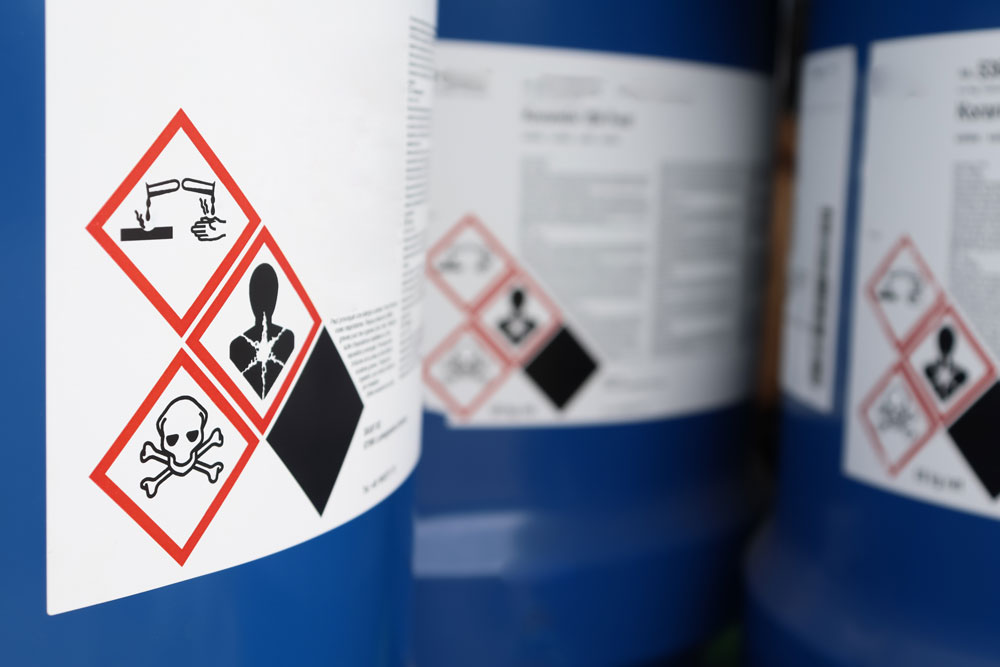How To Clean Up A Corrosive Chemical Spill
 CONTENTS
CONTENTS
- The dangers of a corrosive chemical spill
- How to clean up a corrosive chemical spill
- Why only professionals should carry out hazardous spill clean up
- Contact us today
Should a corrosive chemical spill in your workplace, it can put people’s health at risk and damage your workplace. It must be cleaned up promptly and thoroughly to keep employees safe and enable operations to resume.
Here at ICE Cleaning, we offer emergency response chemical spill cleaning services. Our technicians are fully qualified to handle and dispose of chemicals and hazardous waste, and can deal with any spill no matter the size or severity.
Keep reading to find out what to do if a corrosive chemical spills in your workplace.
The dangers of a corrosive chemical spill
Corrosive chemicals are very hazardous. They damage and destroy other substances they come into contact with, from living tissue to metal and stone. These substances can harm people in several different ways:
- Ingesting a corrosive chemical can burn your mouth, throat, oesophagus, and stomach.
- Inhaling corrosive vapours can irritate the tissues in your throat, nose, lungs, eyes, and windpipe. It may also cause coughing and breathing problems.
- Long-term exposure to and absorption of corrosive chemicals can damage your internal organs and weaken your bone structure. It might affect your nervous system, too.
- Contact with corrosives, such as it splashing on the skin, instantly damages tissue. It will irritate, blister, and burn the skin, and any injuries to the eyes could lead to permanent scarring and even blindness.
They can even ignite combustible chemicals which can lead to fires, resulting in structural damage to buildings, and making workplaces unsafe and unusable for long periods of time.
To prepare for potential spills, you must be aware about the hazards associated with each chemical you store and use at your site. This is an essential part of a chemical spill risk assessment which you are legally obligated to carry out.
You should also write response procedures for each of the hazards, and ensure your workers have the equipment and training required to follow them.
How to clean up a corrosive chemical spill
Alert your staff that a spill has occurred
As soon as you become aware that a spill has happened, notify supervisory personnel and staff about the hazard. If the chemical is dangerous, you may need to evacuate your workers to protect your health. You might also need to alert surrounding businesses and the authorities.
Should the chemical have injured someone, seek medical attention by contacting the emergency services.
Stop the spill getting worse
If safe to do so, make sure the chemical is no longer spilling by closing valves, covering openings with putty, or putting containers upright.
Only a trained professional wearing full personal protective equipment (PPE) and respiratory protective equipment (RPE) should do this. This will ensure they don’t get any corrosive chemical on their skin, breathe in harmful vapours, and reduce their risk of absorption.
Turn off any heat or ignition sources that could create a fire if the chemical is flammable. Any substances that could react with the spilled chemical must be secured.
Ventilate the affected area – or entire facility, when required – by opening windows. You may need to supply workers with gas masks with their own air supply.
Contain the spilled chemical
The chemical will then need to be contained to stop it spreading. Trained professionals will use absorbent materials, like boons and spill socks, and block access to the affected area to stop people going near it.
Spill kits for hazardous chemicals can help you control the spill and clean up the chemical, but they should only be used by people trained to use them, like specialist cleaners.
Clean up the chemical and dispose of the waste
Professional cleaners will collect the material used to contain the spill and dispose of it according to local regulations. A hazardous chemical spill may require plastic pails and drums. They will also need to dispose of equipment they used to clean up the spill, like brooms.
Then, they should thoroughly clean the spill area to ensure all traces of the corrosive chemical has been removed. You can find out more about what to do when a dangerous chemical spills on the Health and Safety Executive’s website.
Why only professionals should carry out hazardous spill clean up
Firstly, specialist cleaners trained in dealing with hazardous chemicals will have the expertise, equipment, and PPE to clean up the entire spill safely and thoroughly.
Should you attempt it yourself, you may be putting your health at risk and might not clean up all traces of the chemical which could put people in danger.
Cleaners will also be able to quickly clean it up. A rapid hazardous chemical spill procedure is essential to minimising damage to your workplace and keeping your workers safe.
Contact us today
Our technicians can clean up any chemical, no matter how hazardous, including acids and alkalis. They are available nationwide, round the clock, and can be on site in a matter of hours in an emergency.
Get in touch with our friendly team to book our technicians for chemical spill clean up on 0208 066 0360 or enquiries@icecleaning.co.uk.

Speak with me today,
I’m here to help
By asking you a few questions either via phone or email I can immediately provide a realistic estimation of the cost.
You’re in good company. We’ve cleaned for the following commercial clients… View all

Why choose us?
- Cater to a wide variety of cleaning situations
- Nationwide coverage, available 24/7
- Cater to commercial and domestic clients
- Free survey provided prior to quotation
- Emergency response team
- Offer a bespoke service designed to suit all your needs
- All technicians hold professional health and safety qualifications, including BICSc, IOSH, Dewpoint Professional & Safe Contractor
We’re fully accredited
We place best practise, professional expertise and health and safety at the core of our business. We’re fully compliant with all legal obligations. You can view a list of our accreditations below, or visit our Health & Safety page for more information.











-RGB-small.1707319151.jpg)




















